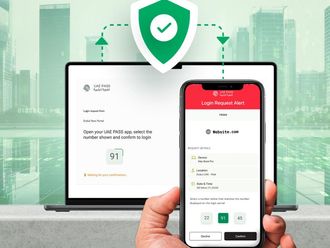
Property has been part of Lizzie Frazer’s retirement plan, but recent developments have made her decision to diversify her investment portfolio more profitable. Frazer and her husband have invested in three properties in the UK — two-bedroom apartments in Manchester and London that were purchased off-plan and an under-renovation two-bedroom apartment in Bradford due to be completed in June.
“My husband and I do not want to work for the rest of our lives, so property investment is very much an early retirement investment for us,” explains the 33-year-old Briton, who works as a lawyer in Dubai. “Pension products in the UK are far from ideal at the moment, so we are looking to save for the future in other ways. The pay in Dubai is a little higher than it is in the UK, so our combined salaries have enabled us to purchase the three properties.
“Moreover, having a tax-free salary also helps and Brexit has caused the British pound to be at an all-time low against the dirham, which has further accelerated our plans for property investment.”
For the Manchester property, Frazer secured 70 per cent financing from HSBC, the couple’s bank in the UAE, lured by the bank’s competitive rates. Their unit in Bradford was a cash purchase because banks do not provide mortgage to expats if the purchase price is under £100,000 (about Dh4.5 million). For the unit in London, the couple is looking for 70-75 per cent mortgage.
“The main challenge for finding finance when you are an expat is that banks generally only lend on purchases over £100,000, so if you are investing under this threshold, you may have problems finding finance,” says Frazer. “Secondly, the pool of banks willing to fund to expats is much smaller than for the UK residents, so it is harder to find competitive rates. Therefore, I would advise overseas property investors to talk to two or three brokers to see what is available in the market for their particular circumstances.”
Akshay Agarwal, 38, believes the UK is good for property investors because of the limited supply that is expected to enter the market, unlike Dubai where prices may still be affected by the significant stock in the pipeline. The Dubai-based private equity professional, who owns multiple properties in the UK, also finds the UK regulatory environment to be very transparent.
However, acquiring bank finance can be challenging for expats. “Most UK banks will not entertain buyers if you live abroad. Moreover, only a handful of UAE banks offer mortgage [for UK property], and unless you bank with them I do not think it easy to get funding,” says Agarwal, who recently purchased a one-bedroom flat in Vauxhall, London. “For me, it was easy to get a mortgage for my flat in Vauxhall because I bank with HSBC and they have a UK mortgage team. It gets easier if you use somebody you know or the bank you have relation with, since there is a lot of paperwork involved. I used my relation manager to do everything for me; that made things convenient, and that’s what I’d recommend.”
Investment hurdles
While the fall of British pound against the US dollar encouraged several cash buyers from the Middle East to invest in UK real estate, those looking for mortgage still need to evaluate their options, usually with the help of an expert. However, David F Hall, partner and head of new homes finance at Knight Frank, says the growing interest in UK property has motivated a number of banks in the UK and UAE to offer services to those purchasing UK property.
“The most important thing for a buyer looking for leverage is to speak to a qualified mortgage broker,” says Hall. “Clients should not expect they could just get funding. Understanding the possible parameters at an early stage gives confidence to purchasers and sellers alike. Hurdles usually arise [because of] the client’s high expectation, assumptions and opacity. For a successful transaction, customers will need to be open, honest and transparent, so that we can provide them with the best solution for their situation.
“Most often, for the best solutions you will be likely introduced to a new bank, who will need to get comfortable with who the client is, their income and, of course, they’re net worth and source of wealth.”
Finance options
Daniel Djokaran, investment consultant at IP Global, points out that 29 banks in the UK are currently lending to UAE expats. There are also lenders in the UAE such as Abu Dhabi Islamic Bank (ADIB) and First Gulf Bank that offer such facility. “It is essential for buyers to find the option that suits them the best, taking into consideration interest rates, loan-to-value [LTV] ratio, currency and, of course, the borrowers’ specific circumstances and investment goals,” says Djokaran.
ADIB provides financing of up to 70 per cent LTV to non-British UAE residents purchasing property in the greater London area. “While each bank has its own risk acceptance criteria, ADIB credit evaluations are guided by the Central Bank requirements for finance to value and debt service ratio,” says Philip King, head of retail banking at ADIB. “Other typical criteria such as tenure and the evaluation requirements are also based on Central Bank guidelines. Customers have to make sure that they are working with a licensed real estate broker and that they are hiring a qualified solicitor to complete the deal.”
King advises investors to study the market where they are purchasing property and to go over the solicitor’s title report to understand the ownership structure and the time remaining on a leasehold property purchase. He also recommends maintaining a good percentage buffer against sudden currency fluctuations. Buyers also need to understand all the charges related to buying property, including service and maintenance charges and taxes.
Investment locations
The UK will continue to attract property investors from the UAE because of its stability, robust economy, transparent legal and regulatory environment and booming population. “Balance the factors against the country’s endemic shortfall of new homes, and it’s little surprise that prices continue to
track upwards at a steady rate — perfect conditions
for the longer-term, five to 10-year investment play most investors would be wise to take,” says Djokaran. “We focus our investments on specific locations that represent pockets of value. Outer London areas such as Woolwich are good examples of this — places that are set to deliver stable, sustainable yields and capital appreciation due
to rising population, significant infrastructure upgrades and economic growth. We are also increasingly looking at regional cities such as Northern Powerhouse’s Manchester, Birmingham and Liverpool.”
Djokaran says the weakened British pound presents a short-term opportunity, with those holding UAE dirhams saving up to 16 per cent on pre-EU referendum conversion rates. However, he cautions buyers not to make any investment decisions based on currency opportunities alone, as he believes in the long-term resilience and strength of the UK economy.
“When it comes to UK property investment, not much has changed in the medium to long term,” says Djokaran. “However, while the dust settles, we see an uncertain picture in the short term, with some encouraging signs — figures published from Nationwide at the beginning of September showed the resilience post-Brexit of UK property prices. The prices rose 5.6 per cent on an annual basis in August, up from 5.2 per cent in July.
“Rics is also reporting a more positive picture in its regular property market sentiment surveys.” Djokaran believes the endemic housing shortfall serves as a crucial growth driver, with an estimated 232,000-300,000 new units per year needed in England, (or a shortfall of between 40 per cent and 53 per cent). “In London and Manchester, this imbalance is even more acute,” says Djokaran.











